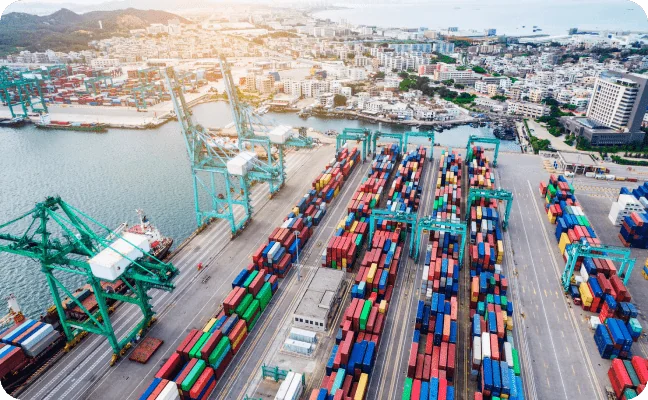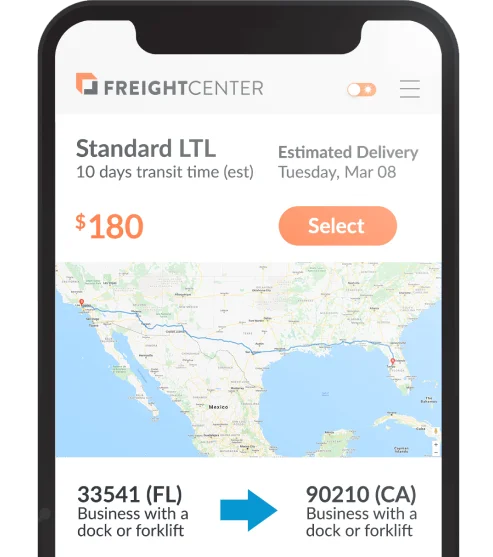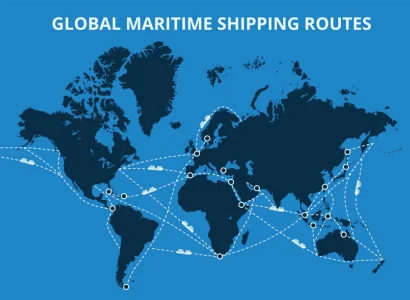
Ocean Container Shipping
Reliable, Cost-Effective Global Freight Solutions
Seamlessly ship full (FCL) and less-than-container (LCL) loads worldwide with FreightCenter. Compare rates, book, and track all in one place.
Explore More Ocean Freight Resources
Get an Instant Ocean Freight Quote FreightCenter’s International Shipping Services Freight Class & Shipping GuideWhat Is Ocean Container Shipping?
Imagine your goods seamlessly crossing oceans, reaching international markets with unmatched efficiency and cost savings. Ocean container shipping is the ultimate solution for businesses looking to move cargo securely and affordably across the globe. With standardized containers designed for maximum protection and scalability, you can ship anything from bulk freight (FCL) to smaller shipments (LCL) with ease. Backed by streamlined logistics, competitive rates, and a vast global network of carriers, ocean freight is the driving force behind international trade—keeping your business connected to the world.
Thousands of businesses trust FreightCenter to move their freight faster, smarter, and cheaper! From unbeatable rates to top-notch service, our customers are raving about their shipping success.
See why they keep coming back!
Award-Winning Service, Trusted by Shippers Everywhere!
- 2021, 2017 & 2016 Food Logistics’ Top Green Providers
- 2021 & 2018 Supply & Demand Chain Executives’ Pros to Know: Matthew Brosious
- 2020 & 2019 Top Food Logistics’ 3PL & Cold Storage Provider Award
- 2020 & 2019 Business Observer’s Top 500 Companies on the Gulf Coast
- 2020 & 2017 SmartWay® Transport Partner
- 2020 & 2017 Food Logistics’ Champions: Rock Stars of the Supply Chain
- 2020 Best of Palm Harbor Awards for Local Businesses
- 2017 Green Supply Chain Award from Supply & Demand Chain Executive
- 2017 Tampa Bay Business Journal Heroes at Work
- 2016, 2015, & 2012 Food Logistics Top 100 Software and Technology Providers
- 2013 Tampa Bay Business 100 by Tampa Bay Business Journal
- 2013 Top 100 Great Supply Chain Partners by SupplyChainBrain
- 2012 TIA Samaritan Award Honorable Mention
- 2012, 2011 & 2010 TBBJ Fast 50 Recipient
- 2013, 2011, & 2010 Diversity Business Top Businesses

Why Choose FreightCenter for Ocean Container Shipping?
When it comes to ocean container shipping, FreightCenter delivers unbeatable value, efficiency, and convenience. Our platform gives you instant access to competitive rates from top-tier ocean carriers, ensuring you get the best price for your shipment—whether you’re booking a full container load (FCL) or a less-than-container load (LCL). With a vast global network of trusted freight lines, we provide seamless connections to ports worldwide, helping businesses expand their reach with reliable, cost-effective shipping solutions.
With FreightCenter, booking ocean freight is easier than ever. Our streamlined online system lets you compare rates, schedule shipments, and track your cargo in real-time from port to port—all in just a few clicks. Plus, our team of logistics experts is always ready to assist, ensuring your shipment arrives securely and on time. Whether you’re a small business shipping overseas or a large enterprise managing high-volume freight, FreightCenter makes global shipping simple, efficient, and stress-free. Get started today and experience the smarter way to ship by sea!
Materials Used in Ocean Container Shipping
When booking and managing an ocean container shipment, several key materials are required to ensure the cargo is adequately documented, secured, and compliant with international shipping regulations. These materials include essential documents, packing supplies, and security measures that facilitate smooth transportation from origin to destination.
1. Shipping Documents & Paperwork
Proper documentation is critical for customs clearance, legal compliance, and cargo tracking. These materials include:
Bill of Lading (BOL):
A legal contract between the shipper and the carrier that includes shipment details, terms, and conditions.
Commercial Invoice:
Lists the value of the goods being shipped, which is necessary for customs clearance and taxation.
Packing List:
A detailed breakdown of the shipment’s contents, including dimensions, weight, and quantity of goods.
Freight Quote or Booking Confirmation:
Proof of the agreed shipping rate and carrier selection.
Customs Declarations & Import/Export Permits:
Required for international trade compliance, especially for regulated goods.
2. Container Packing & Securing Materials
Ensuring cargo is adequately packed and protected is essential for preventing damage during transit. Common materials used include:
Wooden Pallets & Dunnage:
Used to stack and stabilize goods inside the container, preventing shifting.
Shrink Wrap & Stretch Film:
It helps secure palletized cargo and protect against moisture.
Steel or Plastic Straps:
Used to fasten and reinforce large or heavy items.
Desiccant Bags & Moisture Absorbers:
Prevents condensation inside containers, protecting goods from humidity damage.
Foam or Bubble Wrap:
Provides cushioning for fragile items.
3. Security & Seal Materials
To ensure that cargo is tamper-proof and customs-compliant, security measures must be in place:
Container Seals:
High-security locks or tamper-proof seals are mandatory for Full Container Load (FCL) shipments to prevent unauthorized access.
Bolt Seals & Cable Seals:
Heavy-duty locks are required for international container shipping, ensuring cargo integrity.
ISO Standard Container Markings:
Labels indicating handling instructions, hazardous materials, or refrigerated container settings (for reefers).
These materials and supplies work together to ensure secure, compliant, and efficient ocean freight shipping. Would you like to include industry-specific materials for hazardous goods or oversized freight?
To create value for our customers by delivering customized shipping solutions that meet their unique needs and to fulfill shipping demands from simple to complex with expertise, guidance and ingenuity.
FreightCenter’s Full Container Load (FCL) shipping services provide businesses with a secure, cost-effective, and efficient way to transport large volumes of cargo across international waters. With exclusive use of a 20ft or 40ft container, your freight stays sealed from origin to destination, reducing handling risks and transit times. We connect you with top ocean carriers, offer real-time tracking, and simplify the booking process with competitive rates and expert logistics support. Get an instant FCL quote today and streamline your global shipping with FreightCenter!
FreightCenter’s Less Than Container Load (LCL) shipping services provide an affordable and flexible solution for businesses shipping smaller freight volumes overseas. By sharing container space with other shippers, you only pay for the space you need—making LCL a cost-effective alternative to Full Container Load (FCL). We connect you with trusted ocean carriers, offer competitive rates, and provide real-time tracking, ensuring your cargo moves efficiently and securely. Get an instant LCL quote today and simplify your international shipping with FreightCenter!
FreightCenter offers Dry Van Container shipping, the most common and versatile option for transporting goods across international waters. Available in 20ft, 40ft, and high-cube sizes, these fully enclosed, weatherproof containers provide secure and reliable transport for dry goods, consumer products, machinery, and more. Whether you need Full Container Load (FCL) or Less Than Container Load (LCL) services, our network of trusted ocean carriers ensures competitive rates, seamless booking, and real-time tracking. Get an instant quote today and ship smarter with FreightCenter!
FreightCenter’s Refrigerated Container (Reefer) shipping services provide a temperature-controlled solution for transporting perishable goods across international waters. Ideal for food, pharmaceuticals, chemicals, and other temperature-sensitive cargo, reefers maintain precise temperature settings throughout transit. With access to trusted ocean carriers, competitive rates, and real-time tracking, FreightCenter ensures your cold-chain shipments arrive fresh, secure, and on time. Get an instant reefer container quote today and keep your cargo cool with FreightCenter!
FreightCenter’s High Cube Container shipping services offer extra height and expanded capacity for cargo that requires more space than standard containers. Measuring one foot taller than traditional 40ft containers, high cubes are ideal for lightweight, voluminous freight, oversized equipment, and bulk shipments. With trusted ocean carriers, competitive rates, and real-time tracking, FreightCenter ensures your high cube shipments are secure, efficient, and cost-effective. Get an instant quote today and maximize your shipping space with FreightCenter!
FreightCenter’s Open-Top Container shipping services provide a versatile solution for oversized and top-loaded cargo that won’t fit inside standard containers. Designed with a removable tarpaulin roof, these containers allow for easy crane loading of tall machinery, construction materials, and heavy equipment. With access to trusted ocean carriers, competitive rates, and real-time tracking, FreightCenter ensures your specialized freight is secure and efficiently transported worldwide. Get an instant quote today and simplify your oversized cargo shipping with FreightCenter!
FreightCenter’s Flat Rack Container shipping services provide a specialized solution for heavy, oversized, and irregularly shaped cargo that won’t fit in standard containers. With collapsible sides and an open design, flat racks allow for easy loading and secure transport of machinery, vehicles, construction materials, and large equipment. Partnering with trusted ocean carriers, competitive rates, and real-time tracking, FreightCenter ensures your bulky shipments are handled with expert care. Get an instant quote today and ship your oversized freight with confidence!
FreightCenter’s Tank Container (ISO Tank) shipping services provide a safe and efficient solution for transporting bulk liquids, chemicals, and hazardous materials across international waters. Designed to meet strict safety and regulatory standards, ISO tanks offer secure, leak-proof transport for food-grade liquids, industrial chemicals, and petroleum products. With trusted ocean carriers, competitive rates, and real-time tracking, FreightCenter ensures your liquid cargo is handled with the highest level of care and compliance. Get an instant quote today and streamline your bulk liquid shipping with FreightCenter!


How to Book Your Ocean Container Shipment
- Enter your shipment details (origin, destination, weight, container size)
- Compare ocean freight rates from multiple carriers
- Book your shipment online in minutes
- Track your container in real-time
Frequently Asked Questions (FAQs) About Ocean Container Shipping
Navigating ocean freight shipping can feel complex, but FreightCenter makes it simple and stress-free. Whether you’re wondering about costs, transit times, required documents, or shipping options, we’ve compiled the most frequently asked questions to help you get the answers you need—fast. Explore the FAQs below and make your ocean shipping experience smooth and hassle-free!
Q. How much does ocean container shipping cost?
Costs depend on container size, shipping route, fuel charges, and peak season surcharges. FreightCenter provides instant rate comparisons to help you find the best price.
Q. How long does ocean freight shipping take?
Transit times vary from 10 to 45 days, depending on distance, carrier schedules, customs processing, and weather conditions.
Q. What documents are required for international shipping?
You’ll typically need a Bill of Lading (BOL), commercial invoice, packing list, customs forms, and import/export permits (if applicable). FreightCenter helps with documentation guidance.
Q. Can I track my ocean container shipment?
Yes! FreightCenter provides real-time tracking so you can monitor your shipment from departure to arrival.
Q. What types of containers are available for ocean shipping?
Standard options include 20ft, 40ft, and high-cube containers, as well as refrigerated (reefer), open-top, flat-rack, and ISO tank containers for specialized cargo.
Q. What is the difference between Port-to-Port and Door-to-Door shipping?
Port-to-Port requires you to arrange inland transport, while Door-to-Door covers the entire journey, including pickup and final delivery. FreightCenter offers both options.
Q. Do I need cargo insurance for ocean shipping?
While not required, cargo insurance is highly recommended to protect against potential loss or damage during transit. FreightCenter can assist with insurance options.
Q. What goods can be shipped via ocean freight?
Ocean shipping is suitable for manufactured goods, raw materials, consumer products, machinery, vehicles, perishable items (reefer containers), and hazardous materials (with proper permits).
Q. Are there any restrictions on ocean freight shipments?
Yes, certain items like hazardous materials, perishables, oversized freight, and restricted goods require special handling, permits, or carrier approval.
Q. What factors affect ocean freight rates?
Rates fluctuate based on container size, weight, shipping lane, fuel costs, seasonal demand, carrier availability, and customs fees.
Q. How do I book an ocean container shipment with FreightCenter?
Enter your shipment details on FreightCenter.com, compare rates, book online, and track your shipment in real time.
Q. What happens if my shipment is delayed at customs?
Customs delays can occur due to incomplete paperwork, inspections, or regulatory issues. FreightCenter’s experts help ensure compliance to minimize delays.
Q. Can I ship personal items using ocean freight?
Most ocean carriers specialize in commercial cargo, but some allow personal shipments through FreightCenter’s LCL services. Check with our team for options.
Q. How do I get an instant ocean freight quote?
Visit FreightCenter.com, enter your shipment details, and receive instant competitive quotes from multiple ocean carriers
Q. Can I ship personal items using ocean freight?
Most ocean carriers specialize in commercial cargo, but some allow personal shipments through FreightCenter’s LCL services. Check with our team for options.
3 Things You Didn’t Know About Ocean Container Shipping

Over 90% of Global Trade Moves by Ocean Freight
Most of the world’s goods—including electronics, clothing, and food—are transported by container ships, making ocean freight the backbone of international trade.

Containers Revolutionized Shipping in the 1950s
Before standardized containers, cargo was manually loaded and unloaded, causing long delays. The introduction of intermodal containers drastically cut shipping times and costs, transforming global logistics.

A Single Container Ship Can Carry Over 20,000 Containers
Modern mega-ships like the Ever Given (yes, the one that blocked the Suez Canal) can carry over 20,000 TEUs (twenty-foot equivalent units), moving massive amounts of cargo across the world in a single trip.

